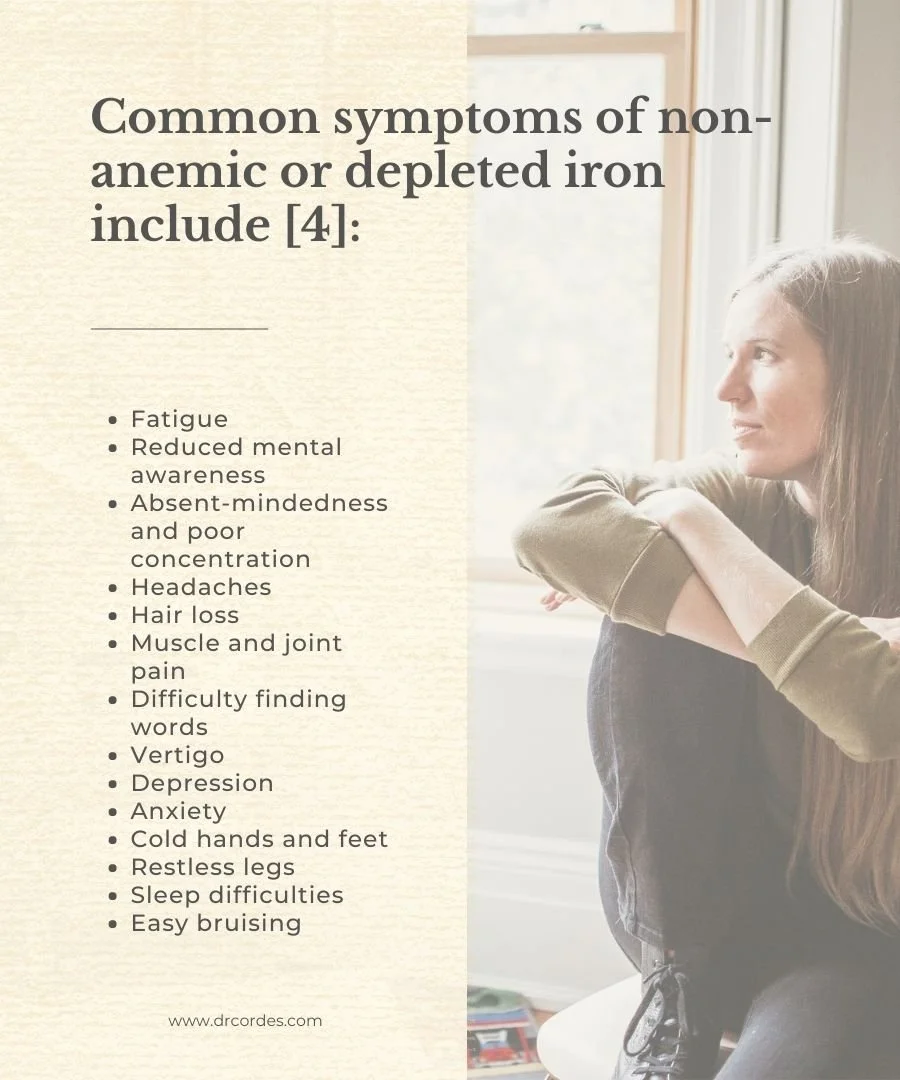Iron and Mental Health
Did you know that iron levels affect your mood? Not only can low iron cause fatigue because it’s responsible for transporting oxygen to your tissues, but it is also involved in the function and synthesis of neurotransmitters (brain chemicals) like serotonin, norepinephrine, and dopamine [1-3].
Many people have symptoms of low iron long before they are anemic, and ferritin, the storage form of iron that is commonly used to assess iron levels, can be falsely elevated (like with acute or chronic inflammation). Because so many people with depleted iron aren’t anemic and fall into the normal ferritin range, they are often told their iron is “normal” despite experiencing symptoms.
So how would you know that low iron is an issue?
If anything on your blood work looks suspicious or if your ferritin marker seems high for your symptoms and dietary/supplemental intake, some practitioners may suggest getting additional blood work.
A simple iron panel and testing for inflammation can often bring more clarity to what may be going on. This can be done by a naturopathic doctor and allows us to assess how full your iron transport proteins are. It’s another piece of the puzzle that can be helpful in determining if your iron levels could be a cause of your symptoms.
A Note of Caution
Keep in mind that iron supplements interact with several medications. Taking more iron than you need can also be dangerous, because iron causes severe damage to the body when in excess. It’s important to see a practitioner who understands ferritin levels and iron panels in order to supplement safely.
Side Effects
Iron supplementation is generally well-tolerated, however gastrointestinal side effects are common, especially constipation. I usually recommend iron bisglycinate (although it does depend on the person), because it tends to be well absorbed and better tolerated than some other forms on the market.
References
Abbaspour N, Hurrell R, Kelishadi R (2014). Review on iron and its importance for human health. Journal of research in medical sciences: the official journal of Isfahan University of Medical Sciences, 19(2):164. PMID: 24778671
Beard J. (2003). Iron deficiency alters brain development and functioning. The Journal of nutrition, 133(5):1468S-72S. doi: 10.1093/jn/133.5.1468S
Markova V, Holm C, Pinborg AB, Thomsen LL, Moos T. (2019). Impairment of the developing human brain in iron deficiency: correlations to findings in experimental animals and prospects for early intervention therapy. Pharmaceuticals, 12(3):120. doi: 10.3390/ph12030120
Soppi, E. (2018). Iron deficiency without anemia – a clinical challenge. Clinical Case Reports, 6(6): 1082-1086. doi: 10.1002/ccr3.1529
Killip, S., Bennett, J., & Chambers, M. Iron Deficiency Anemia. American Family Physician, 75(5): 671-678. https://www.aafp.org/afp/2007/0301/p671.html
BCGuidelines.ca (2019, April 17). Iron deficiency – Diagnosis and management. British Columbia Ministry of Health. https://www2.gov.bc.ca/assets/gov/health/practitioner-pro/bc-guidelines/iron-deficiency.pdf


